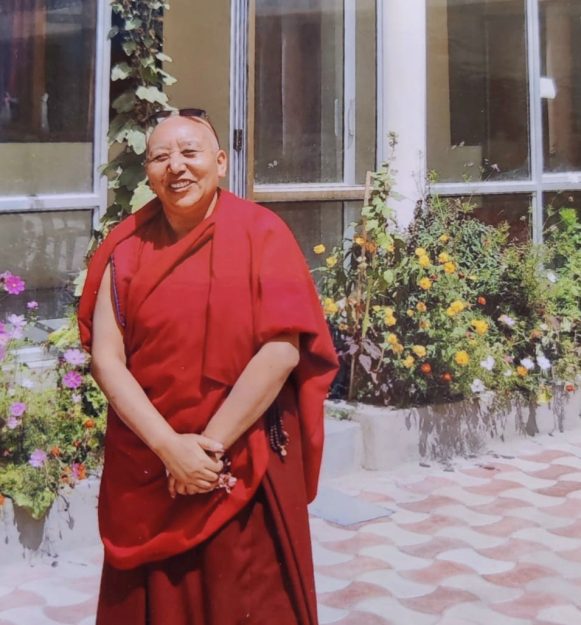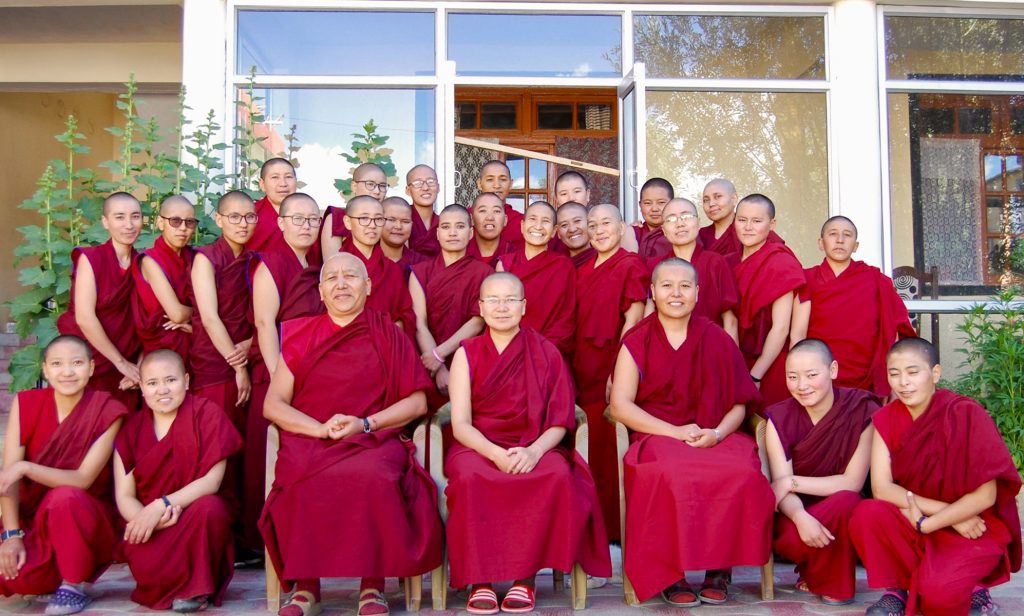This article was originally published on Tricycle. It is reprinted here with permission.
Arriving at Thubstan Choskor Ling nunnery in Leh, Ladakh, you might first notice a five-seat pickup truck with the words “Nuns Association” printed on its windshield. In this vehicle, groups of Tibetan Buddhist nuns travel to remote villages in the mountains where they distribute herbal medicine and educate local people in environmental stewardship. These nuns belong to the Ladakh Nuns Association (LNA), which works to fight climate change, improve the health of Ladakhi communities, and elevate the status of Buddhist nuns locally and globally.
Ladakhi nun Venerable Dr. Tsering Palmo, who is also an amchi, or traditional Tibetan medicine doctor, founded the association in 1996 to provide local nuns and laywomen—especially those from economically strained villages or nomadic families—with the opportunity to achieve secular and monastic education, to train as medical practitioners, and to rise as leaders of social welfare projects in the region. She focuses specifically on environmental and healthcare initiatives. Today, the Ladakh Nuns Association sponsors seventy nuns to receive full-time education, and fifteen of these nuns recently completed training in the Tibetan medical system.

I first met Dr. Tsering Palmo in 2019 and reconnected with her over the phone in early 2022. During one of our recent calls, Dr. Palmo told me, “We want to train nuns as dharma teachers, counselors, and healthcare workers. Nuns can serve a need for the community: they can be guides when people and the planet are in trouble.”
Ladakh has suffered the effects of climate change acutely in recent years. Rapidly receding glaciers and changes in snowmelt patterns have resulted in frequent water shortages, increases in flash flooding, and cyclically failing crops in its agriculture-dependent villages. The region is also experiencing an increasing loss of mountain biodiversity—a loss that bears economic, cultural, and health implications. Research from the Department of Earth Science, University of Kashmir shows that the average annual temperature in the region increased by approximately thirty-three degrees between 1980 and 2016.
We want to train nuns as dharma teachers, counselors, and healthcare workers. Nuns can serve a need for the community: they can be guides when people and the planet are in trouble.
Climate change has impacted Tibet’s traditional medical system, known as Sowa-Rigpa, too. Tibetan medicinal practices, honed and utilized across centuries, rely on the availability and harvesting of herbal materials. Many of Ladakh’s medicinal plant species are becoming rarer with each season due to climatic changes, making efforts to gather, produce, and distribute key traditional medicines progressively more challenging. Dr. Palmo emphasizes: “Environmental issues are critical for human beings. If there is no health in the environment, there cannot be health for human beings.”
Each year, LNA nuns travel to provide communities in Ladakh’s villages with training in conservation, sustainable waste management, and the cultivation of medicinal herbs. As many LNA nuns hail from village areas, this provides the chance for nuns to extend their skills to family members and to the places they call home. Dr. Tsering Palmo explains, “There is the precious opportunity to share experiences and resources with the villagers. In particular, women and nuns can learn from each other and support each other in meeting many difficulties and social issues. Our nuns have been involved in reviving the traditions of nuns, but also in engaging closely with our community.”
Through dialogue and connection with people from across Ladakhi society, and especially with laywomen, the nuns are able to strategize and distribute many vital forms of social and environmental service. In past years, the LNA amchi nuns have spent several days annually in the Changthang and Karnak Valleys collecting local herbs; the nuns also travel to the high pass of Khardong la on the Ladakh Range. Each year, new nuns begin their training as practitioners of Tibetan medicine and join in for the annual plant harvesting and community education trips to village areas.

The nuns teach about the harms of burning plastic waste and encourage trainees to plant fruit trees and vegetable gardens. They also provide educational workshops in the cultivation and stewardship of mountain herbs commonly used in the Tibetan medical system. Following these trainings, they return to the villages seasonally to collect seeds saved by community members, which are then planted in the LNA greenhouse in Leh.
We cannot place blame: we have the opportunity to learn from these problems, which can help us to develop strength within ourselves.
Meanwhile, for over a decade, the LNA nuns have operated two Tibetan medical clinics in Leh to provide consultation and treatment free of charge to people who are physically or emotionally unwell. The walls of the clinics are lined with neatly labeled jars of Tibetan herbal medicine, many of which were collected during harvesting trips to villages and the mountain slopes of Ladakh. According to LNA, approximately 7,000 people receive treatment at these clinics each year. In times of crisis, including during outbreaks of COVID-19, the nuns initiate mobile clinics, providing aid to village residents who otherwise could not access care.
For the LNA nuns, environmental education, healthcare support, and practice of the dharma are deeply interconnected. As Dr. Tsering Palmo told me, “We cannot place blame: we have the opportunity to learn from these problems, which can help us to develop strength within ourselves. We can share that strength and can transform one another through the practice of compassion and loving kindness for one another.”






